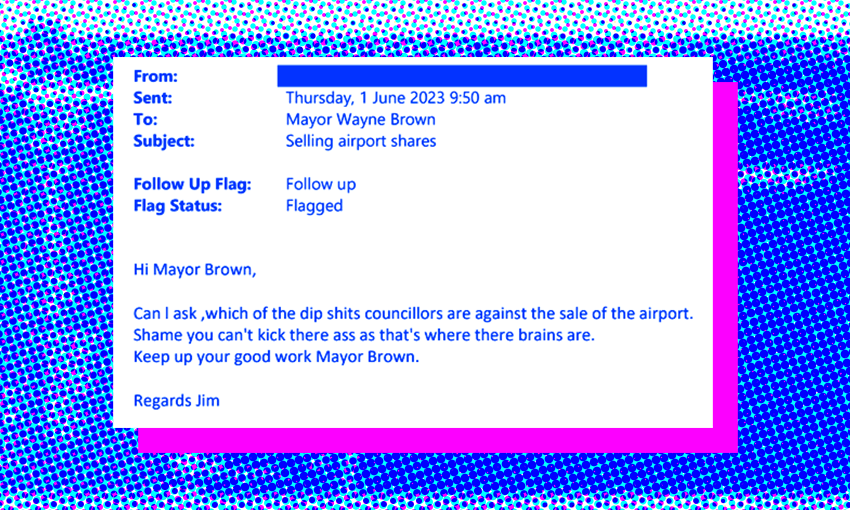Wayne Brown called most of his councillors ‘financially illiterate’ during a press conference yesterday morning. He then went back to the office and sent them emails from constituents who called them ‘dip shits’.
Auckland mayor Wayne Brown spent a good portion of Thursday morning berating his councillors. In an 8.30am press conference at Auckland Transport’s Viaduct headquarters, he said most of the city’s top elected representatives were “financially illiterate”. Christine Fletcher, Mike Lee, Wayne Walker, and John Watson were singled out by name for signing a low-rates pledge by the Ratepayers Alliance, then refusing to back his plan to mitigate rates rises by selling airport shares.
The Spinoff can reveal that Brown returned to his office that afternoon and sent similarly-themed correspondence to councillors directly, this time through the medium of constituent emails.
At 4.46pm, he sent councillors a one-line email saying “On behalf of Mayor Wayne Brown, please find attached – Emails received today – Feedback on Mayoral Proposal for Auckland Council’s Annual Budget 2023-24.” The accompanying PDF was a compendium of annoyed and occasionally abusive missives, almost all of them from people condemning hold-out councillors and backing the Brown budget.
“Can l ask which of the dip shits councillors are against the sale of the airport. Shame you can’t kick there ass as that’s where there brains are. Keep up your good work Mayor Brown. Regards Jim,” said one.
Other correspondents were slightly more reserved in their language, though still vehemently in favour of the mayor and his plans. “I have been watching your battle with the entrenched management of the Auckland council, and you seem to be winning. To get rid of the airport shares which are highly inflated ,like everything in New Zealand ,would be a coup for you, and a great part to take down the cities deficit,” said Stephen.
“The next round of champagne & smoked salmon is on me!” said Roger. “Keep doing what you are doing ‐ Auckland needs you now more than ever!”
The collection also included feedback from Wellingtonians, Hamiltonians and Cantabrians. Wellington mayor Tory Whanau caught some stray sexist vitriol in one of the out-of-town emails. “I only wish Wellington could have a right‐wing mayor instead of a lightweight greenie who loves handbags, and we’re stuck with Grant Robertson MP who squanders money wholesale.
“Keep up the good work and your attacks on the left‐wing media ‐ they are drongos,” said John.
John wasn’t alone in praising Brown for his antagonistic posture toward the media. “I am no longer an Aucklander but if I was I would have certainly voted for you. This latest nonsense about cherry picking reporters is too funny,” said Jennifer from Canterbury.
Jennifer was one of three women included in the collection of 18 emails. One of the female correspondents, Wendy from Hamilton, finished her email with the Latin phrase “illegitimi non carborundum”, which translates to “don’t let the bastards bring you down”.
Not every writer was so positive about the mayor. Gordon was concerned to read about his decision to exclude media from that morning’s press conference. “I hate to have to say it, but if you can’t handle the heat maybe it’s time for you to re-consider as to whether you’re the right person to lead our great city,” he said.
Several councillors also appear to be taking a dim view of the mayor’s actions. In a reply-all email, North Shore councillor Richard Hills asked why he and his colleagues had been sent the collection. “Several of these emails aren’t from people who live in Auckland. Some are well-known trolls. One of them is calling councillors ‘dip shits’ and abusing other elected officials,” he said. “Some of us are trying to get to a good outcome here and we’ve got hundreds of our own emails and messages to respond to already.”
The Spinoff understands at least one other councillor also replied to Brown’s email asking why they’d been sent the correspondence. Several councillors have been critical of the mayor’s bullish, sometimes highly confrontational approach through the budget process. One – Alf Filipaina – recently accused him of “blackmail” over the way he’s tried to make continued funding for community initiatives contingent on voting to sell airport shares.
As things stand, Brown doesn’t have the votes to sell those shares or pass his preferred version of the council’s annual budget.
But he does appear to have the majority support of his email correspondents.





